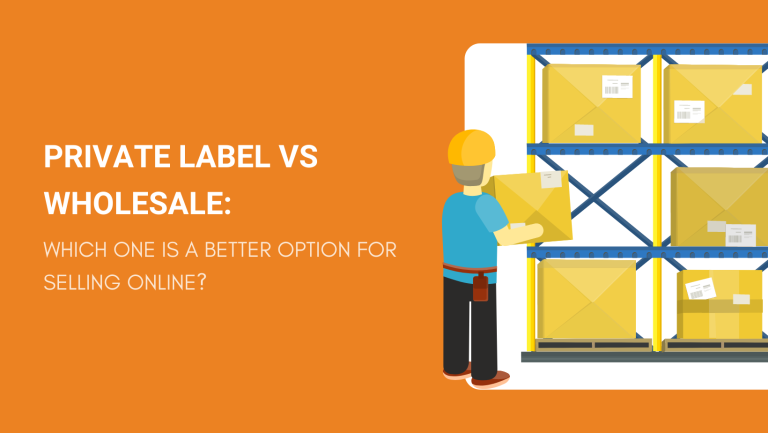E-commerce has been booming with every passing day as people are moving more towards online buying. But when it comes to selling online, new and old ecommerce sellers are always confused between private label vs wholesale business models.
That is why we have brought this ultimate guide to help you decide which business model you should select. This article will help you understand both business models along with their comparison and respective pros and cons.
By the end of this article, you will have a clear idea of which business is best for you.
Let’s start.
Private Label vs Wholesale: What Do They Mean for Online Sellers?
Before getting into the details and comparison between both business models, let’s first discuss what private label and wholesale mean for online sellers.
What Is Private Label Selling?
Private label means to get your products manufactured with special instructions to make those products different from others in the market.
You will have to contact the manufacturer of the product and share the requirements or features that you want in your customized product.
There is another option to start selling a product as a private label. You can also start private labeling by doing product branding.
You can get an existing product and ask the manufacturer to make some slight changes to that product. That’s it. Your private label product will be ready.
Let’s discuss an example of private labeling on Amazon. The screenshot below shows a pet hair removal product. The product is sold as a single piece on Amazon for $16.45 and it is tagged as “Amazon’s Choice”.
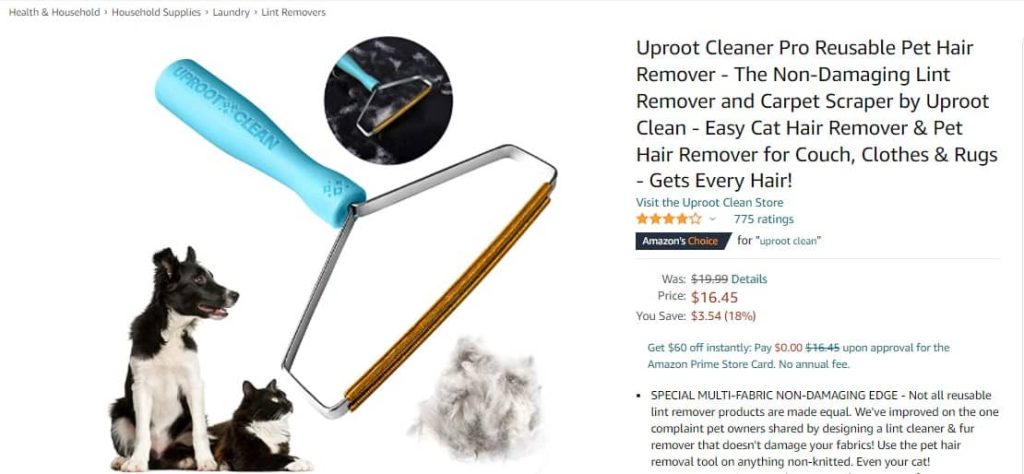
The number of its reviews and ratings shows that this product is selling well on Amazon.
You will notice that the handle of this product shows the name of the brand engraved on it.
The seller has made it a private label product by getting “Uproot Clean” engraved on its handle and with small other changes which we will discuss in a while.
This product is also available without a brand name on Amazon.
What Is Wholesale?
The wholesale business model has relatively a simpler idea. You just have to buy products in bulk quantities and sell them one by one on a retail model. The cost per product will be lower if you buy in bulk quantities and you will sell them at higher prices in retail.
This is the common practice in online selling. The concept of wholesale is also quite common in traditional selling too. Buying products in bulk and selling them piece by piece is the idea that every retailer is familiar with.
As we are discussing online selling, let’s see an example of wholesale on Amazon.
In the screenshot below, you will notice that the product is similar to the one that we discussed in private labeling.
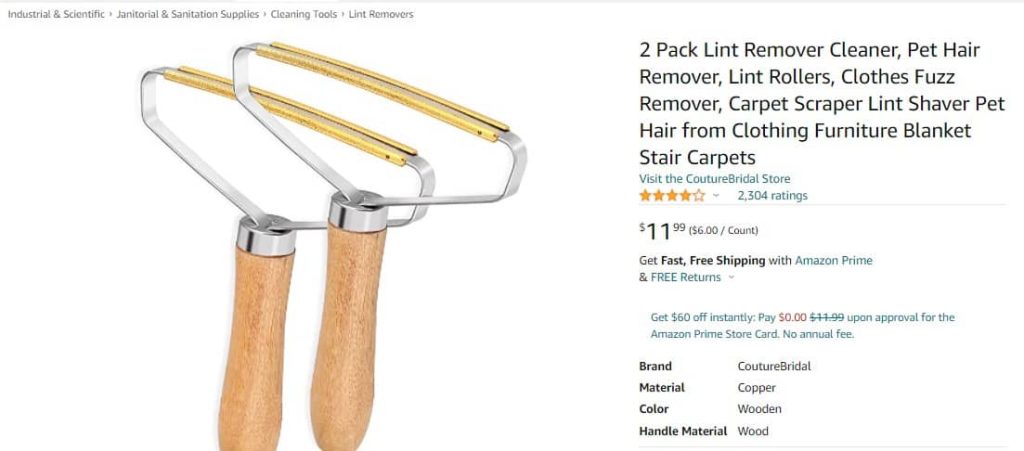
It is a similar pet cleaner with the same purpose. The performance would also be the same as the product being sold as a private label.
You will notice that there is no brand name written on the product. There are some other slight differences in both products too.
You can see the difference in prices. This wholesale product costs around $12 and it is a set of 2 pieces. That costs one pet cleaner for $6 for a customer.
On the other hand, the private label pet cleaner costs $16.45 for a single item. This means that private label selling gives you more profit margin in most cases.
Let’s discuss the differences between private label and wholesale in detail for more clarity.
Private Label vs Wholesale: What Are the Differences?
The differences between private label and wholesale selling are listed below.
Branding
Wholesale products are general products with no specific brand names on them while private label products are sold with specific brand names.
You will find many products in the market that will have no brand names upon them. Those are most likely the wholesale products.
But that doesn’t mean that all wholesale items will come without brand names. You will also find products that will have some kind of a brand name upon them.
These names or logos are more likely the manufacturer’s brand. The wholesale sellers sell those products with the same names.
Features
Almost all wholesale items for a specific purpose will have the same features. That is because the sellers have not asked to make any changes to the products. They are just reselling the same products.
The private label products have specific features that will make those products different from the wholesale products. The differences in the features can be as little as the specific color of the product or a brand name printed on a product.
Product Availability
Wholesale products are available in abundance with multiple sellers. That is why you will see a lot of products on a single or multiple online platforms that will look the same and will have the same features.
This is because all the wholesalers usually buy from the same manufacturers. A manufacturer makes the product in huge quantities and sells them to multiple buyers. These buyers sell the same products on a retail model.
In contrast, private label products are not found in abundance. They are mostly available with a single seller who had asked the manufacturer to develop the products according to his directions.
Price Differences
Generally, there will be a reasonable price difference between a wholesale product and a private label product. Wholesale products will have lower selling prices as compared to private label products.
Number of Sellers
You will find a lot of sellers selling the same products in the wholesale model as seen in the screenshot below.
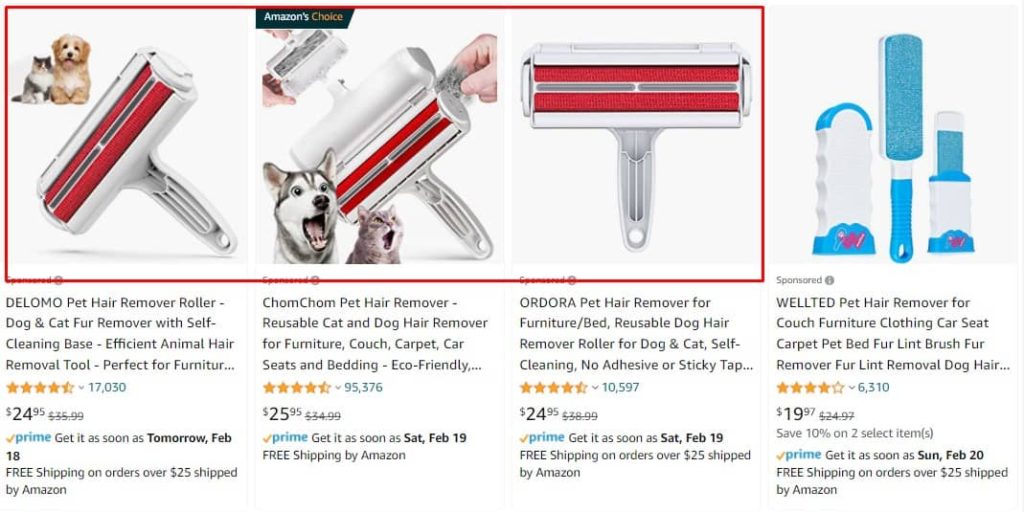
You can see the same product is being sold by different sellers at Amazon for nearly similar prices. This is common in wholesale products.
On the other hand, a private label product will be sold by a single seller at Amazon or any other platform. See the screenshot below.
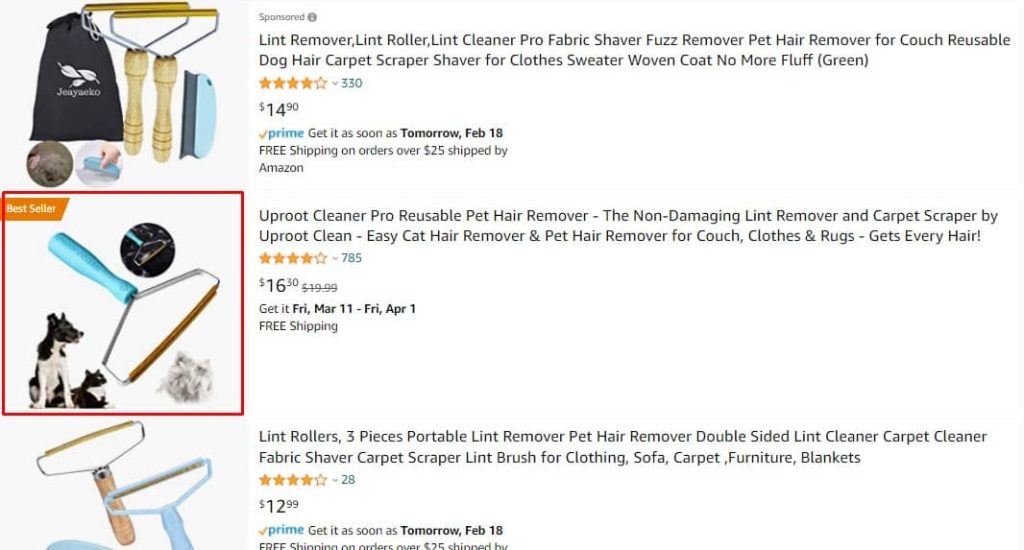
When you search for “Uproot Clean” on Amazon, you will get it from a single seller that has this name engraved on the product.
While you will also get multiple other results for similar products but they will not have this name written on them.
Sellers’ Focus
There is a difference between the focus of sellers for wholesale and private label products. Private label sellers are naturally more focused on selling their items because they have already decided to sell those specific products and have invested on them.
Private label sellers have already carried out their product research before deciding on their products. That is why they have invested in particular products with customization.
On the other hand, the sellers for wholesale products are usually going with the flow. They are mostly selling multiple products. That’s why they do not tend to focus on a single product.
Now that we have discussed the main differences between wholesale and private label businesses, let’s discuss the pros and cons of each business model.
Private Label vs Wholesale: Pros and Cons
Following are the pros and cons for private label and wholesale businesses. Have a look at each of them to decide which one suits you best.
Pros of Private Label
The pros or advantages of private labeling are discussed briefly below.
High-Profit Margins
Earning profit is the main objective behind every business. Sellers go for private labeling to increase their profit margins.
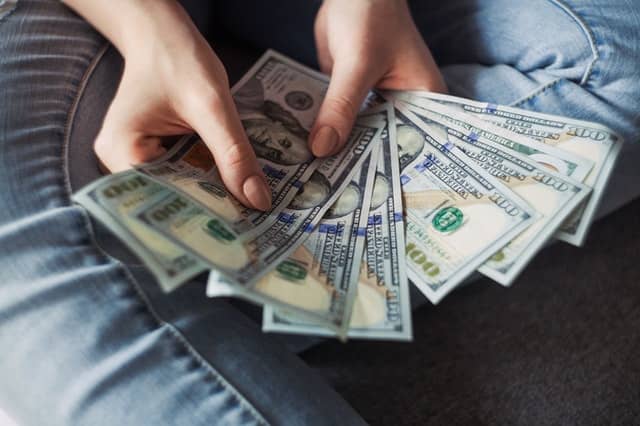
As we discussed in the overview of private label and wholesale at the start of this article, we noticed the price difference between a wholesale and private label product.
You have a chance of selling a private label product for as high as 3 times the price of a wholesale product.
That is because you will not have to be competing with other sellers for the same product which brings us to the second advantage of private labeling as mentioned below.
Low Competition
There will be minimal competition on the private label business model. That is because the exact products will be available with you only.
There will be no other seller who will have the same product with all of those features. You can say that you may have competition with established brands for the same products.
That comes naturally in private labeling because of the following two reasons.
- Other sellers won’t have access to your products.
- Other sellers won’t be interested in establishing their competitor’s brand.
Brand Image
As private labeling comes with a brand image, you will have an opportunity to build a brand in the online marketplaces.
Establishing a brand would mean more business opportunities for you.
If you sell high-quality products and your customers are satisfied with your products, you will have the leverage of earning customers’ trust.
This brings us to another advantage of private labeling as discussed below.
Customer Loyalty
The online world is full of substandard products. If you read customers’ reviews across different platforms, you will come to know that most customers have a trust deficit when it comes to buying something online.
If your customers are satisfied with your branded products, you will ultimately earn their loyalty. They will start trusting and remembering your brand name if you provide them with excellent customer service and quality products.
This brings us to yet another great advantage of private labeling as follows.
Repeat Sales
Customer’s trust or loyalty comes with a beautiful gift of repeat sales for you. Once a customer has made a satisfying purchase from your brand, it is more likely that he will get the same products from you again.

This especially happens when you are selling a product that customers require in more quantities from time to time. This is very good news for every brand owner.
In another case, your customers might also recommend your brand to other people in their circles.
This unveils another great advantage of private labeling mentioned below.
Customer Referrals
A satisfied purchase from a customer never goes to waste. If your customers are happy with your product, there is a good chance that your customers will refer your product to their friends and family.
If someone in your customers’ social circle inquires about your product, he will share your brand name and the store details with him.
In another case, if someone from the social circle of your customers sees the product with your brand name written on it, he may also want to buy that product if he likes it.
In both cases, you would have more sales eventually turning into more profits for your business.
Cross-Selling Opportunities
Private labeling is not limited to a single product. Once your brand name is established, you will expand your avenues and add different products to sell under the same brand.
Dropshipping Avenues
Dropshipping is the idea of selling someone else’s product via your store. If your private label product has a good demand in the market, other suppliers might also get interested in reselling your products via their stores.
You can make a deal for other sellers by offering them a lower price so that they remain competitive in the market.
This will mean more business, more sales, and eventually more profits for you.
Cons of Private Label
Having a lot of pros come with a few cons for private labeling too. Let’s discuss the disadvantages of the private label business model.
Difficult Product Selection
The biggest problem with private label selling is probably finding and selecting the product itself.

When you start doing product research to shortlist which product you should select as a private label, you would see that almost every other product is available on the online marketplaces.
So, finding and selecting a product that can fill the gap in the market is quite challenging.
High Investment
Getting a product manufactured or making customization to a product requires high investment. Simply put, private label business requires a higher amount of money injection in many ways. They are listed below.
- Higher costs for product customization.
- Higher marketing budgets are required to establish a private label product.
- Higher cost of advertisement required.
- Higher operational costs are required for product handling and warehousing, etc.
Higher MOQ
If you ask a manufacturer to make a customized product for you, it will come with a certain (MOQ) minimum order quantity. You will have to bear the MOQ because private labeling won’t be possible without it.
If your private label products are not getting sales in the start, you would have to bear the cost of holding those products until you start getting sales.
Higher Efforts
More efforts are required to penetrate the market with private label products. That is because customers don’t trust new brands in the first place.

You would have to do things like doing SEO (search engine optimization) of your store, writing compelling product descriptions, etc to attract customers.
You may also have to go for tactics like Influencer marketing and affiliate marketing to establish your brand.
Difficult Sourcing
Finding private label manufacturers is a specialized task. It is not easy to find a reliable manufacturing partner who will manufacture products for your business.
You may have to hire the services of a product sourcing agent for private labeling because you would not want any troubles with your investment.
Pros of Wholesale
Let’s discuss the pros or advantages of selling wholesale products.
Lower Investment
Selling wholesale products requires a lesser amount of investment. That is because you don’t have to spend money on getting product customization and launching special marketing campaigns.
Simpler Model
The wholesale business is a lot simpler than the private label because you don’t have to deal with any kind of special activities like brand image and specialized descriptions, etc.
You will not also be required to create special product listings on Amazon in the case of wholesale.
Existing Demand
Wholesale products have existing demands in the market. That is because other wholesale sellers have created the demand in the market and you can get your share of the pie just by being available in the list of sellers for those products.
You may only need to lower the price of those products and you can start getting sales.
Early Sales
Selling wholesale items is relatively easier. That is because you would just have to play with your pricing. You just have to buy running products from the source and start selling them on the retail model via Amazon or any other sales channel.
You can go with Amazon FBA just by putting your inventory in Amazon’s warehouse and you will be good to go.
Private label is an extensive process requiring you to work right from the start to establish the demand of that product in the market.
Decent ROI
You can get a 15-20% return on investment by selling wholesale items. It is a decent ROI to start doing business.
Most online sellers start with wholesale businesses. That’s because it gives you a better idea of the products which you should select for private labeling.
Easy Product Selection
Wholesale business does not require much effort to do extensive product research. You just have to see what the market trend is and you can start selling on Amazon or any other platform like other sellers.
Easy Product Sourcing
Sourcing products for wholesale business is not an issue. You won’t need a specific kind of supplier for this purpose.
You can even have multiple suppliers for the same product in the wholesale business.
Cons of Wholesale
Following are the cons of selling wholesale products.
Intense Competition
The ease of doing business with wholesale products comes with the disadvantage of fierce competition. You would notice that the same products are being sold by multiple sellers.

So, to remain competitive and relevant in the market, you would have to do something different to get your share of sales and profit.
Squeezed Profit Margins
Intense competition comes with squeezed profit margins. If there are a lot of sellers for a single product, you would have to decrease the price of that product to attract customers.
This ultimately gives benefit to the customers but this is at the cost of sellers’ decreased profit margins.
FAQs about Private Label and Wholesale
We have answered the frequently asked questions about private label and wholesale businesses. Have a look at them for further clarity between the both.
Is Wholesale or Private Label More Profitable?
Profitability depends upon your objectives and how you want to do the business. If we talk about the profit margins per product, you will most probably have more profit margins with the private label business.
But at the same time, if you want to deal with the higher sales volume, you will have overall more profit margins in the wholesale business.
So, it is relative and depends upon your business objectives and the efforts you put in to start the business model.
What Is Safe to Start between Private Label and Wholesale?
Starting a wholesale business is a safer option for new sellers as compared to private labeling. That is because the wholesale business model has lower risks involved.
Consider having no or very low sales for your private label products that have required a reasonable amount of investment from you? You will most probably have to lower the prices for your private label products in that case.
This won’t be good news for your private label business because you would still be competing with wholesale products.
So, wholesale requires lesser risk as you can sell your wholesale products to other sellers at a purchase price to avoid losses in the worst case.
You won’t be having this option in the case of private labeling because the cost per product in private labeling would already be higher than the cost per product in wholesale.
So, no seller will be interested in buying those products from you even at your purchase prices.
How Do I Find Wholesale and Private Label Suppliers?
Most products are sourced from China owing to their cheapest costs. While you may find suppliers who supply the products for both business models simultaneously, it is always better to find the best suppliers in that niche.
A smart way to find the suppliers for wholesale or private labels is to get the services of a professional sourcing agent. NicheSources is the top sourcing specialist for buying products from China and we know where to find the right suppliers for your business.
Summary
Starting a wholesale or private label business requires extreme care and detailed analysis of the business dynamics.
Both business models may seem to coincide in some aspects but they require different business strategies and are meant for different business objectives.
We hope this guide helps you decide which business model is right for you to start but we can say one thing for sure. If you are just starting as a seller, you should consider starting with the wholesale model and gradually move on to launch your private label business.
If you want help regarding product sourcing from China, you can always ask for a free quote. One of our representatives will be right there to assist you with the required steps and costs involved in the overall process.
